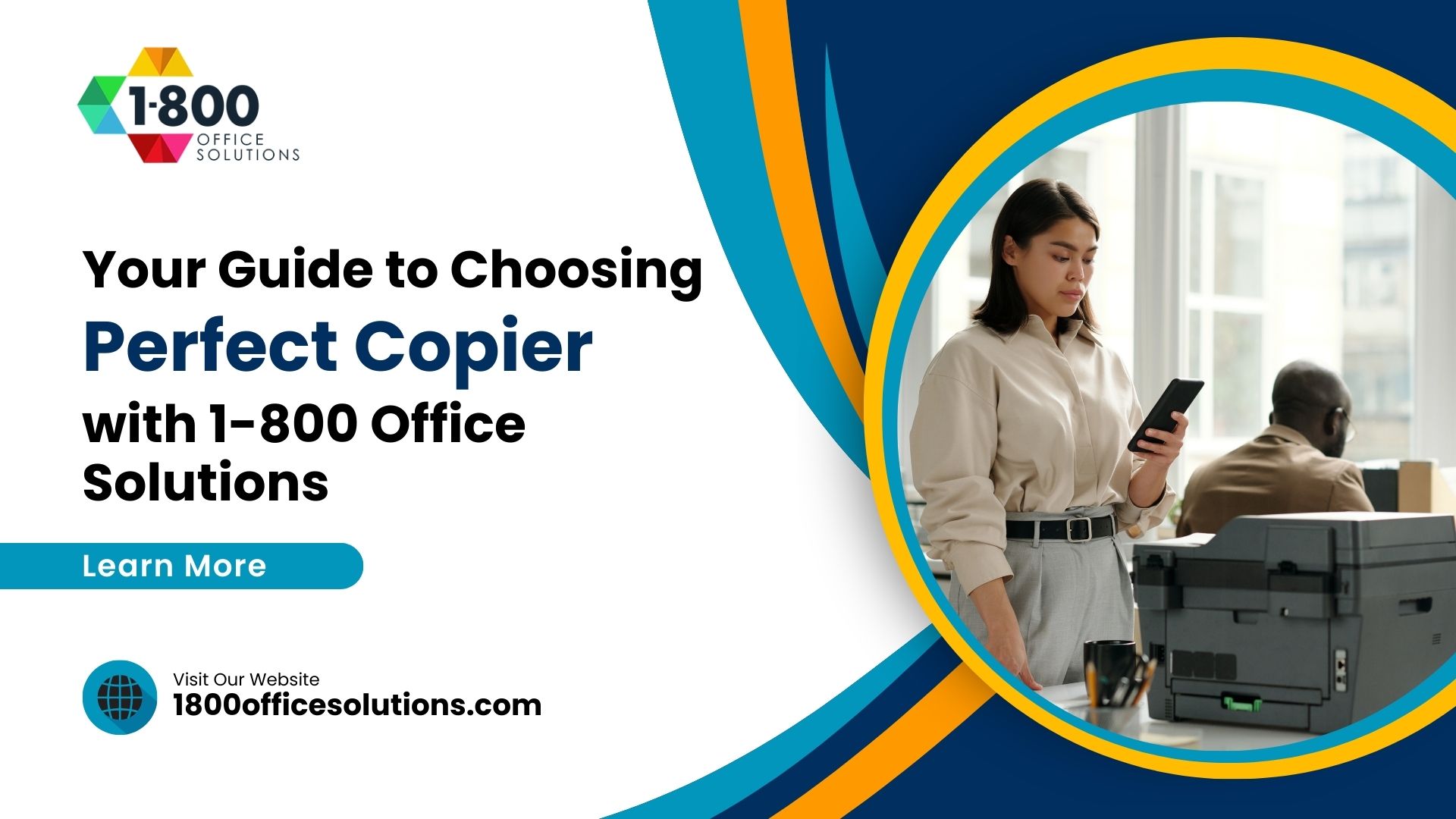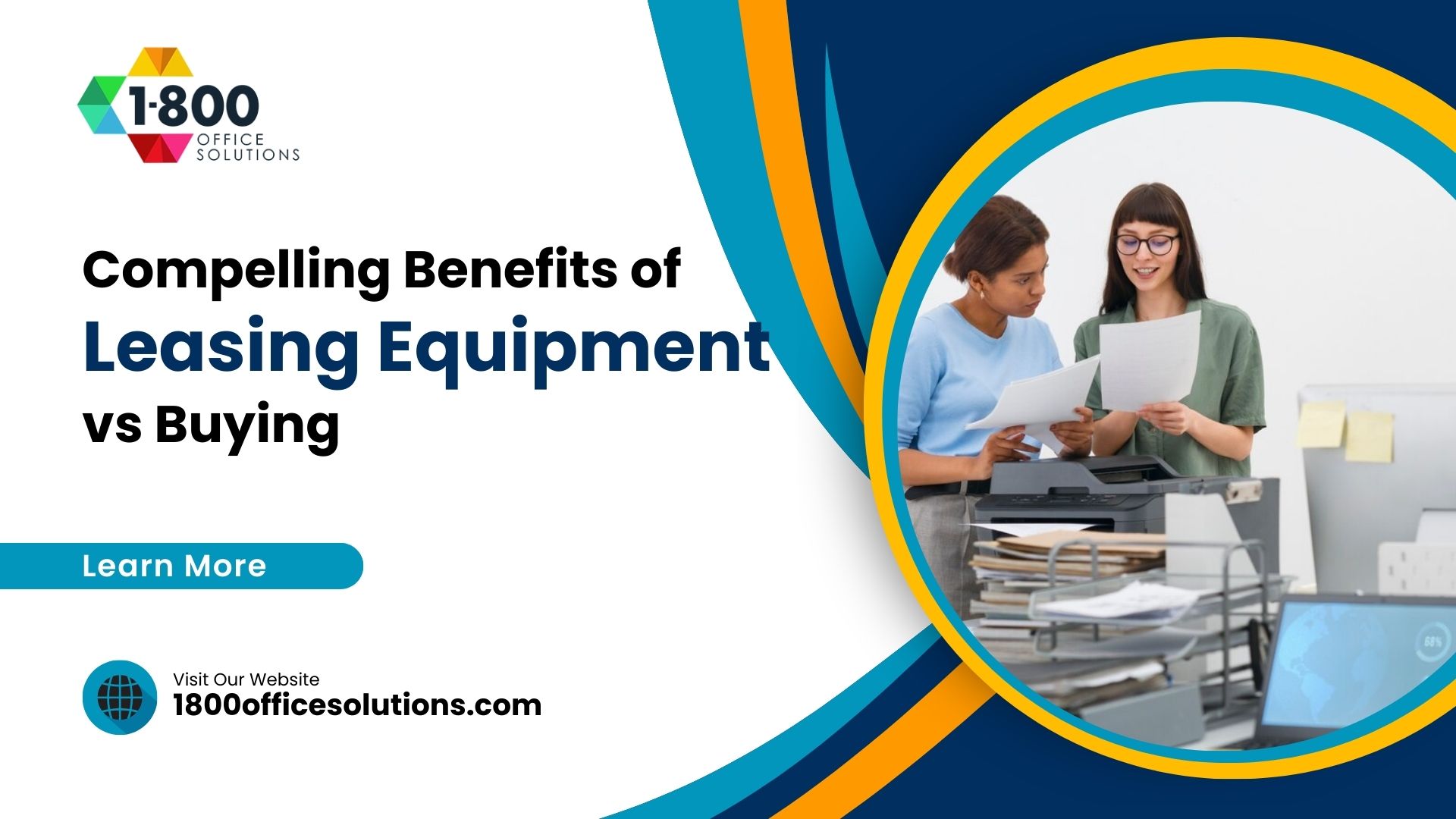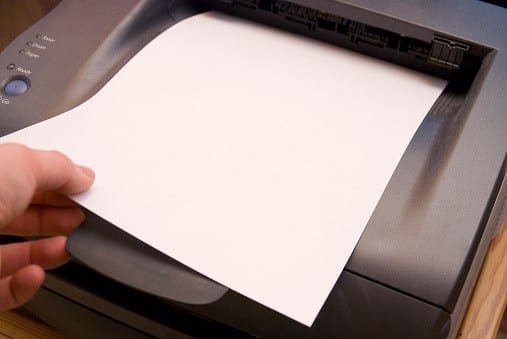Copier for Rent: The Unexpected Solution to Your Biggest Business Challenge!
Introduction
In the modern business environment, the copier is more than just a machine; it’s an essential piece of office equipment. From printing important documents to scanning contracts, the multi-functionality of copiers has made them indispensable. But with technology advancing rapidly, businesses often face a critical dilemma: To buy or to rent?
Purchasing a copier means a significant upfront investment, while renting or leasing offers flexibility and often includes services like delivery and maintenance. The decision is not merely a financial one; it’s about aligning the equipment with the business’s needs, growth plans, and technological landscape.
New Black & White Copiers offer the latest models, but is buying the right solution? On the other hand, Pre-Owned Black & White Copiers provide affordable options for those who prefer to own. Let’s delve into the benefits of renting a copier to understand why it might be the unexpected solution to your biggest business challenge.
Benefits of Copier for Rent
No Monthly Payment
Renting a copier, unlike leasing, often involves a one-time payment. This approach eliminates the need for tracking and processing monthly invoices, freeing up administrative time. For businesses looking for a temporary solution or those that need a printer or copier for a specific project, renting provides an immediate answer without long-term commitments. The absence of monthly payments also means that the company can allocate funds to other essential areas, enhancing overall financial flexibility.
No Finance Charges or Interest
When you opt for a copier rental, you bypass the finance charges and interest that typically come with leasing. These charges can add up over time, making the overall cost of the machine more expensive than initially anticipated. By renting, businesses can control costs more effectively, knowing the exact investment upfront. This transparency in pricing helps in budgeting and ensures that there are no hidden fees that might affect the company’s bottom line.
Tax Benefits
Renting a copier may offer specific tax benefits, depending on the jurisdiction and the nature of the business. Some regions allow companies to write off the entire rental cost as a business expense, resulting in lower taxable income. It’s essential to consult with a CPA or tax professional to understand how renting a copier can align with your company’s tax strategy. These potential savings can make renting an attractive option, especially for small and medium-sized businesses looking to optimize their financial resources.
Eliminate Shipping Costs at End of Lease
Leasing a copier often comes with hidden costs, such as shipping the equipment back to the lease company at the end of the term. These costs can range from $400 to $800 or more, adding an unexpected burden to the budget. Renting a copier, however, eliminates this recurring cost.
The rental company usually handles the return, making it a hassle-free process. This convenience, coupled with cost savings, adds to the appeal of renting over leasing, especially for businesses that value simplicity and transparency in their agreements.
Retain the Value of the Asset
When you purchase a copier, you own it for its entire useful life, retaining the asset’s value. In contrast, leasing means upgrading to a new copier at the end of the term, losing the residual value. Renting offers a middle ground, allowing businesses to utilize the latest technology without the commitment of ownership. If the copier meets the company’s needs, extending the rental or even purchasing the equipment might be an option, preserving the value and providing flexibility in decision-making.
Flexibility to Make Changes
Renting a copier provides the freedom to upgrade or change the equipment as needed. Unlike leasing, where early termination or buyout penalties may apply, renting offers the flexibility to adapt to changing business needs. Whether it’s a need for a more advanced multifunction copier or a shift in printing volume, renting allows businesses to respond quickly without financial penalties. This adaptability is particularly valuable in today’s fast-paced business environment, where agility and responsiveness are key to staying competitive.
Extend the Useful Life of Copier
Purchasing a copier means committing to its entire lifespan, which might be six or seven years or longer. Renting, on the other hand, allows businesses to extend or shorten the usage based on their needs. If the copier is still functioning well and meets the company’s requirements, the rental period can be extended. This flexibility ensures that the business always has access to equipment that aligns with its current needs and goals, without being tied to a long-term commitment.
Cash Flow Considerations
Cash flow is a vital consideration for any business, and the decision to buy, lease, or rent office equipment plays a significant role in financial planning. Renting a copier can be a strategic move to preserve cash flow, especially for startups or companies facing temporary cash constraints. By avoiding finance charges, interest, and the burden of monthly payments, renting allows businesses to allocate funds to other growth areas. It also provides the opportunity to test the equipment before making a more substantial investment, ensuring that the copier is the right fit for the company’s needs.
Renting a copier offers a range of benefits that align with various business needs and financial considerations. From eliminating monthly payments and finance charges to providing flexibility and preserving cash flow, renting may indeed be the unexpected solution to your biggest business challenge. Whether it’s a temporary need or a strategic move to test new technology, renting a copier offers a viable alternative that deserves careful consideration. Contact us today to explore how copier rental can be the right solution for your business.
Comparing Lifespan: Leased vs. Purchased Copiers
Average Lifespan of Purchased Copiers
When you buy a copier, you’re investing in a multi-function device that can serve your office needs for many years. The average lifespan of a purchased copier is around 78 months, providing reliable service and consistent print quality. Owning a copier means having full control over its maintenance and usage, without the constraints of a contract. It also allows for customization and integration with other office systems.
For businesses looking for a long-term solution, purchasing a copier from reputable manufacturers like Canon or Konica Minolta ensures quality and support. Whether you’re a small business or a large corporation, owning a copier provides stability and can be a cost-effective choice in the long run.
Average Lifespan of Leased Copiers
Leasing a copier, on the other hand, offers a short-term rental solution. The average lifespan of a leased copier is 42 months, significantly shorter than that of a purchased one. This shorter term aligns with the demand for the latest technology and the flexibility to upgrade. Copier lease agreements often include maintenance and technical support, ensuring that the equipment runs efficiently.
For businesses that value adaptability and want to keep up with technological advancements, leasing provides an affordable and outstanding option. Here’s a variety of copier options to explore if you’re looking to rent. Leasing also allows for predictable pricing and can be tailored to fit your needs, making it a popular choice for many organizations.
What People Also Ask
Why do businesses prefer leasing over purchasing?
Businesses often prefer leasing over purchasing because it offers flexibility and access to the latest technology. Leasing a copier allows for regular upgrades, ensuring that the equipment stays current with technological advancements. It also provides predictable monthly payments and often includes comprehensive support and maintenance. Leasing can be a cost-effective solution for businesses that need to streamline their operations without a significant upfront investment.
What are the hidden costs associated with leasing a copier?
Leasing a copier may come with hidden costs such as early termination fees, overage charges for exceeding print limits, and costs for returning the equipment at the end of the lease. Additionally, long-term rental agreements might include escalation clauses that increase the monthly payments over time. Understanding the full terms of the lease, including any potential hidden fees, is essential when considering this option.
How often should a business upgrade its copier?
The frequency of upgrading a copier depends on the business’s specific needs and the technology’s capability. With a leased copier, upgrades can occur at the end of each lease term, aligning with the latest features and functions. Purchased copiers might require upgrades less frequently, depending on usage and technological advancements. Regular assessments of the copier’s performance and alignment with business needs can guide the decision on when to upgrade.
Are there tax benefits associated with purchasing a copier?
Yes, purchasing a copier may offer tax benefits, such as depreciation deductions or immediate expensing under certain tax codes. These benefits can result in significant savings for businesses and contribute to the overall affordability of owning a copier. Consulting with a tax professional to understand the specific tax implications for your business is advisable when considering purchasing a copier.
What is the average lifespan of a purchased vs. leased copier?
The average lifespan of a purchased copier is around 78 months, while a leased copier typically lasts 42 months. Purchasing offers long-term usage and potential cost savings over time, while leasing provides flexibility and access to the latest technology. The choice between purchasing and leasing depends on factors such as budget, technological needs, and business growth plans.
Conclusion
The decision to lease or purchase a copier involves careful consideration of various factors, including cost, lifespan, technological needs, and business growth plans.
Leasing: Offers flexibility, access to the latest technology, predictable pricing, and often includes maintenance and support. It’s an ideal solution for businesses that value adaptability and want to keep up with technological advancements without a significant upfront investment. Leasing is often preferred for short-term rental solutions and by businesses that need to get started quickly with minimal hassle.
Purchasing: Provides long-term stability, control over maintenance, and potential cost savings over time. It’s suitable for businesses looking for a long-term solution and willing to invest in a reliable multi-function device. Purchasing ensures quality, customization, and integration with other office systems.
In conclusion, whether you’re a business seeking a temporary solution or a long-term investment, the choice between leasing and purchasing a copier should align with your specific needs and financial considerations. Understanding the pros and cons of each option, considering factors like free delivery, setup, savings, and support from a knowledgeable technician, can guide your decision. Call us at Sterling Copier Sales for a comprehensive discussion on the best copier and printer rentals available in the Maryland and Metro area. With years of experience and a commitment to delivering efficient and reliable services, we’re here to help you find the perfect solution to enhance your office’s productivity.












